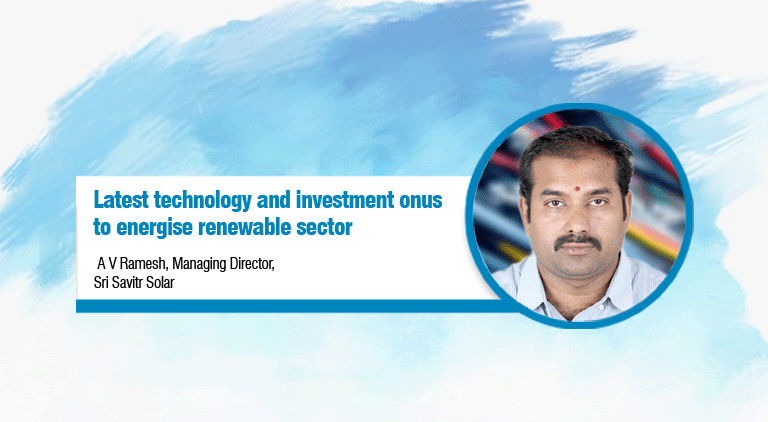Latest technology and investment onus to energise renewable sector
By EPR Magazine Editorial December 12, 2019 3:26 pm IST
By EPR Magazine Editorial December 12, 2019 3:26 pm IST

”India has enough expertise, enough of encouragement, also investment opportunities but because of lack in application of these factors India is lagging.”
Discussing about the requirement of implementing new technologies, and investments in for renewable energy sector, A V Ramesh, Managing Director, Sri Savitr Solar tells Megha Iyer that this can boost the renewable sector and may bring solutions to most of the concerns, but there has to be a way out to bring them together at right place on right time.
What kind of regulatory changes are you expecting from the government for solar energy / solar plants?
If the government wants to safeguard the Indian solar manufacturers, then they must come up with certain policies following which encourages the local the companies to come forward for installing solar cell plants and solar wafer plants. This would reduce the dependency of solar imports and foreign products. Moreover, the government must provide waiver on customs duty on importing solar equipment. Some schemes and policies must be made where the companies can get an exemption on certain things on meeting the requirements within a certain period of time. Such policies and regulations must come into the picture that would encourage the Indian manufacturers also to expand their existing capacity of investing and installing a solar plant.
Even Indian companies are keener in having a solar cell plant and not solar wafer plant. If nobody takes interest in having a solar wafer plant, there would be a huge dependency on imports. As, for having a solar cell plant, solar wafers are of equal importance. So I think India should have solar wafer plants also in order to reduce the imports and start indigenous manufacturing in India itself.
Installation of solar wafer plants, one need silicon ingots. Since silicon ingots is the basic requirement for a solar cell plant, its imperative that we have equal number or solar wafer plants and we not just the solar cell plant. Interestingly rarely anyone is talking about solar wafer plant, companies are more keen on solar cell plants, whereas a wide set of silicon resources are available in India, but away from the sight of the government and the industry. One of the key reasons why these things are not being considered is the capital investment, expertise in technology and solar expertise.
There are major players (silicon) who can come forward and contribute for solar cell plant, but again they are not considering having a solar wafer plant. This would then discourage other manufacturers investing for solar wafers plant.
I think India have enough expertise, enough of encouragement, also investment opportunities but because of lack in application of these factors, India is lagging.
What products have you launched recently?
Land acquisition is said to be one of the major concerns for putting up solar power plants. Why so you think that is happening and what can be done to evade the prevision?Dropping tariffs has been a major concern for the EPC players which even led to the shut down of several EPC companies. Your take on it!
The major drawback here is, due to the continual dropping tariffs, no EPC players are coming forward attempting to bag a tender to put a plant and grab the project. Instead, no tenders are being submitted by the EPC players, because of which the assigned and quoted tenders for installation of solar plants or solar cell plants are cancelled altogether.
Every industry looks for consistency and commitment, and fall in either of them, throws the industry and its players off balance. Especially what concerns of tariff keep increasing, the industry has to face an unbalanced environment either in consistency or in terms of commitment. Such situations not just create a furore amidst the industry but also kicks back the sentiments of the industry’s EPC players.
I think, dropping solar tariffs requires government’s intervention and consider the genuinely of a project and the longevity of a company. The government must look into these facts and only then they must badge tariff rates. So it’s highly critical that the government encourage the EPC players and other companies to put up and invest in solar plants.
Moreover, some of the government policies are against the solar raw material by imposing safeguard duty on solar cells, anti-dumping duty and EVA on glass etc. Though, the demands in India is catered by the available manufacturers, still the government is insisting on having domestic manufacturers and buying products from domestic manufacturers. But the fact which is being ignored here that the government is unable to meet the Indian requirements.
A V Ramesh, Managing Director, Sri Savitr Solar
We use cookies to personalize your experience. By continuing to visit this website you agree to our Terms & Conditions, Privacy Policy and Cookie Policy.